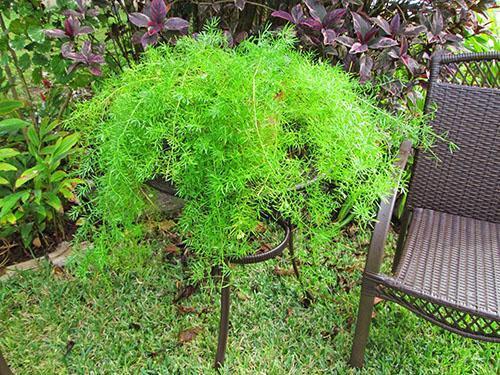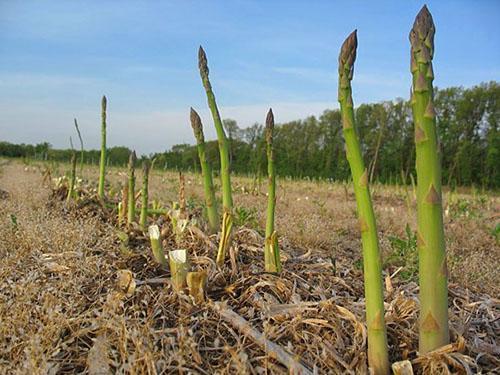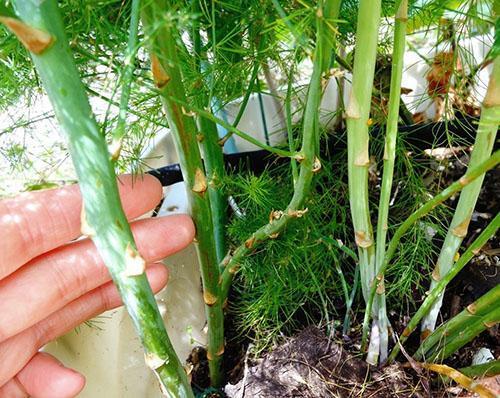Useful properties of asparagus and its use in traditional medicine
 Representatives of the asparagus genus are not only decorative green species and vegetable crops, but also truly medicinal plants with a rich set of useful properties and qualities.
Representatives of the asparagus genus are not only decorative green species and vegetable crops, but also truly medicinal plants with a rich set of useful properties and qualities.
The most studied official medicine representative of the genus is pharmacy asparagus or vegetable asparagus. Investigating the biochemical composition of the asparagus plant, scientists discovered the first amino acid, asparagine, which is part of proteins, which helps to bind ammonia, which is toxic to the human body, and to remove excess fluid back in the century before last.
According to biologists and chemists, in the green part and roots of the plant there are many mineral salts, organic acids and vitamins, among which the leaders are B vitamins and ascorbic acid.
But, in addition to this species, in the asparagus family, there are about three hundred unique plants, no less interesting and useful. How does traditional medicine use the healing properties of asparagus, and is the benefits of the plant confirmed by the doctors of the traditional school?
Useful properties of asparagus

In particular, such plant materials are capable of:
- reduce the frequency of migraine attacks;
- relieve inflammation of the bladder and kidneys,
- remove excess fluid;
- remove substances and toxins hazardous to humans.
In addition, the asparagine contained in asparagus helps to lower blood pressure, has a beneficial effect on the state of the heart and vascular system.
 In traditional medicine, asparagus, as a member of the asparagus family, is used to prevent dropsy, kidney disease and vascular damage due to the formation of cholesterol plaques.
In traditional medicine, asparagus, as a member of the asparagus family, is used to prevent dropsy, kidney disease and vascular damage due to the formation of cholesterol plaques.
These beneficial properties of asparagus are due to the content of asparagine and some other compounds. However, the existing plant species are not all studied as it happened with vegetable asparagus.
Asparagus racemes: properties and significance in Indian medicine
 Most of the species are still waiting for attentive researchers, but in the homeland of asparagus racemose, in India and other regions of Indochina, this species has been successfully used for many centuries to treat various ailments.
Most of the species are still waiting for attentive researchers, but in the homeland of asparagus racemose, in India and other regions of Indochina, this species has been successfully used for many centuries to treat various ailments.
The Indian traditional medicine system, Ayurveda, recommends asparagus root remedies for a variety of diseases and conditions. The racemose asparagus, named for the characteristic shape of the inflorescences, is called shatavari in its native region, which can be translated as "a hundred doctors" or "a cure for a hundred diseases."
 Elongated large tubers that form the basis of the root system of the plant and determine the beneficial properties of asparagus. Shatavari has a beneficial effect on the reproductive function of women and men.
Elongated large tubers that form the basis of the root system of the plant and determine the beneficial properties of asparagus. Shatavari has a beneficial effect on the reproductive function of women and men.
 The representatives of the fair half take preparations from dried asparagus roots:
The representatives of the fair half take preparations from dried asparagus roots:
- causes increased lactation;
- improves the menstrual cycle;
- relieves heaviness and pain during menstruation;
- we have a diuretic effect;
- soothes and gently tones.
According to the studies, the beneficial properties of asparagus are really capable of such an effect, and the tubers are rich in substances that stabilize the hormonal system of a woman.
 This is due to the accelerated conversion of estradiol to estrol, as well as the fact that the homeopathic remedy activates the synthesis of such an important hormone as progesterone. As a result, taking a traditional medicine drug that uses the healing properties of asparagus is an excellent prevention of many formidable tumor diseases of the female genital area.
This is due to the accelerated conversion of estradiol to estrol, as well as the fact that the homeopathic remedy activates the synthesis of such an important hormone as progesterone. As a result, taking a traditional medicine drug that uses the healing properties of asparagus is an excellent prevention of many formidable tumor diseases of the female genital area.
The properties of asparagus can increase the production of human milk, as well as cope with neuroses and other unpleasant symptoms in women of childbearing age and those experiencing menopause.
Men who take preparations from the rhizomes of the asparagus plant experience an increase in potency, a decrease in the severity of inflammatory processes in the genitals and urinary organs. Doctors also note an improvement in sperm quality.
In general practice, homeopaths use asparagus root powder if the patient suffers from stomach ulcer, gastritis with high acidity, as well as with dysentery and enterocolitis.
Treatment with such a tool is also carried out externally. The beneficial properties of asparagus are manifested in eczema, acne, accompanied by inflammatory and purulent processes, dry and rough skin.
 And recent research has shown that the minerals and amino acids in the asparagus plant can not only protect the liver from toxins, but also alleviate the effects of alcohol on the body by eliminating some of the symptoms of a hangover.
And recent research has shown that the minerals and amino acids in the asparagus plant can not only protect the liver from toxins, but also alleviate the effects of alcohol on the body by eliminating some of the symptoms of a hangover.
Possesses asparagus and natural antioxidant properties that can resist or stop aging of tissues and the entire human body.
Asparagus: is the plant poisonous?
 All these types of asparagus, whether grown in the garden or at home, bloom and then form small rounded berries of orange, red or bluish-black hue. The green parts of the plant contain saponins, which are toxic to humans. But if there are not many of these compounds in phylloclades, then the concentration of toxin in berries is much higher and can be dangerous for pets, and especially for young children who pay attention to bright fruits.
All these types of asparagus, whether grown in the garden or at home, bloom and then form small rounded berries of orange, red or bluish-black hue. The green parts of the plant contain saponins, which are toxic to humans. But if there are not many of these compounds in phylloclades, then the concentration of toxin in berries is much higher and can be dangerous for pets, and especially for young children who pay attention to bright fruits.
Eating such berries, which make asparagus a poisonous plant, threatens with vomiting, diarrhea, and abdominal pain.
The intensity of symptoms depends on the age, weight and health of the person who ate the dangerous fruit. In addition, contact with the mucous membrane of berry juice causes allergic reactions and irritation. Most often, the symptoms disappear in a day or two, but in order to avoid complications, it is necessary to take first aid measures in the form of drinking plenty of fluids and taking enterosorbents, and also consult a doctor.
Medicinal properties of garden asparagus - video
https://www.youtube.com/watch?v=pHWCvMtVdZU
class !!!!!
The article is good, but I did not have enough information about whether other types of asparagus are used for medicinal purposes, or everything that is written about racemose asparagus can be attributed to other species?
To date, only a few species of asparagus have been studied. Apart from the racemose, the Cochin asparagus also has healing properties. It is widely used by Chinese medicine for the manufacture of complex medicinal drugs. Most of the varieties of culture have not yet been explored. It is possible that among the nearly 300 plant species there are also beneficial asparagus, but this is not yet known.